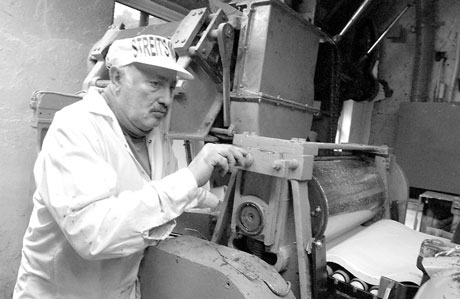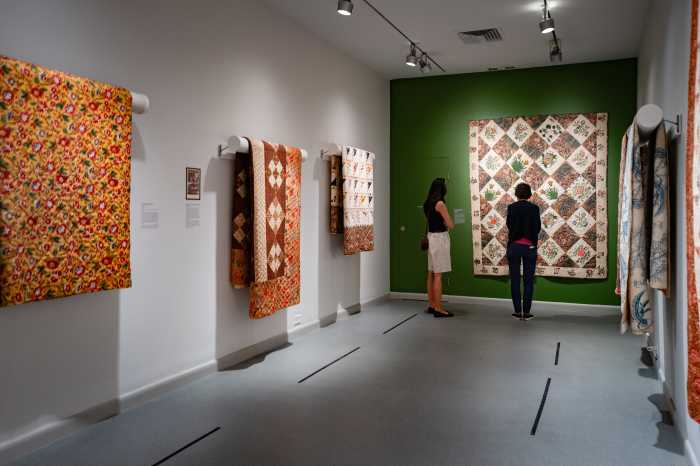By Bonnie Rosenstock
When October rolls around, most people set their sights on the upcoming fall and winter holidays. But not the Streit family. For them, October signals “spring cleaning,” the season to roll out Passover matzos, the traditional unleavened bread that Jews eat during the eight-day holiday, which begins in April this year. The Streit’s factory is shut down for a week for a thorough cleaning, and all daily production of year-round matzo ceases. Non-Passover products (malt, shortening, salt, etc.) are removed from the factory.
All chutes are opened and cleaned with compressed air, towels, a steam machine and a blowtorch under rabbinic supervision. The floors and walls, are scrubbed clean, so that not a particle of non-Passover flour dust remains. Passover baking will continue until just a few weeks before the holiday, but may go on longer depending on supply and demand.
Five generations of Streits have been engaged in this process for almost 80 years. In the 1890s, Aron Streit and his wife, Nettie, immigrated to America. Around 1915, Streit, who had prior matzo-baking experience in his native Austria, opened his first handmade matzo factory on Pitt St. on the Lower East Side.
In 1925, after a brief respite in the Catskills while his oldest son Irving recuperated from a respiratory condition, Streit and son opened a “modern machine” bakery on Rivington St. between Delancey and Suffolk Sts. where the factory still operates.
When Streit’s other son Jack was older, he joined the family concern. (The Streits also had two daughters.) Streit then purchased the three adjoining buildings to accommodate the expanding business.
Aron Streit died in 1937, but his progeny carry on the enterprise, proudly preserving it as the only family-owned and operated matzo company in America. (Bernard Manischewitz, whose grandfather founded the kosher foods, sweet wine and matzo empire in 1888 in Cincinnati, was the last generation to run the family company. He sold it in 1991 to private investors. He died in September 2003.)
Today, four Streit descendants — three great grandsons and one great-great-grandson — work at the factory full time, and three of the granddaughters sit on the policy-making board of directors. Alan M. Adler, 52, whose grandfather was Irving, handles production and legal matters. Adler’s first cousin, Aron Yagoda, 36 (Jack’s grandson), deals with ordering and distribution; like Adler, whose Hebrew name is Aron, Yagoda was named for his great grandfather. Mel Gross (also an Irving grandson) is in charge of sales.
Gross’ son, Aaron (with two “A”’s — he was named after his paternal grandfather of the same name, not to be confused with great-great grandfather, Aron Streit, with one “A”) is the fifth generation and works in the sales office, “learning the business from the ground up,” says Adler. “When the phone rings and somebody says, ‘Is Aron there?’ it sounds like ‘Alan,’ and they don’t know which Aron [or Aaron], so we’re always getting the wrong phone messages,” he says.
According to Adler, Passover matzo hasn’t changed much in thousands of years because of stringent religious requirements. It must consist of just flour and water and be baked within 18 minutes. “We have many rabbis supervising — at the matzo-forming machine, in the mixing room, to inspect the flour when it arrives in the morning,” he explains. “Water for Passover has to sit overnight, so we have three tanks that have to be filled up for the water to sit. The rabbis lock and unlock the water tanks to make sure the matzo meets the strictest rabbinical standards.”
After 18 minutes, the mixing bowls, the arms of the mixers and the rollers on the matzo-forming machine are completely cleaned. The rabbis carry stopwatches to insure accuracy. “If there’s ever a mechanical breakdown that lasts for more than a few minutes,” Adler says, “the dough is thrown out, the entire line is shut down and the machines — the mixers, chutes and matzo-cutting machines — are thoroughly cleaned from top to bottom with towels, compressed air and scrapers.”
Some of the equipment — the ovens and some packing machines — date back to the 1930s. “Actually, we find that some of the older machines do a better job than the modern machines, although it’s hard to get parts. If anything breaks, we basically have to custom make them,” says Adler.
Streit’s manufactures about 150 products, including noodles, pickles, applesauce, cake and soup mixes, canned soups, borscht and ketchup. Only the matzo products are made on Rivington St.; the others are packed in outlying plants in New York and Canada. (Their other line, Ethnic Delights, is imported from various countries.) Streit’s has a factory workforce of about 80.
Adler characterizes the company as “small-to-medium sized,” adding they sell “millions of pounds of matzo and matzo products.” He admits that it’s hard to compete with Procter & Gamble, for example. “There’s no doubt we could benefit from a multi-million-dollar advertising budget,” he notes. “But there’s a certain pride in walking through the same halls that my father walked through, that my grandfather walked through, that my great-grandfather walked through. There’s a family history here that means more to us than making some money by selling to a large corporation.”
His cousin Aron concurs. “We all hung out here as kids. We played in the retail store. My daughter is only 18 months. When she says the word, I’ll bring her into the business,” he says.
Adler’s son, Hillel, just turned 9, has already gotten his hands into the mix. “He puts on his hat, coat and gloves and pushes the dough down the chute into the matzo-forming machine. He loves coming down,” Adler says with fatherly pride.
The company’s number-one seller is still the blue-label, unsalted matzo for daily use. However, other flavorings have been added over the years to keep up with the times, including salt-and-pepper matzo (last year) and Mediterranean matzo with sun-dried tomatoes, garlic, olive oil and basil.
Naturally, their customer base is primarily Jewish. But judging from e-mails and letters that Adler receives, other ethnic groups are also munching on matzos, and some churches in the South and Southwest use them as communion wafers. “It’s not just a Jewish food product anymore,” Adler declares. He explains that according to industry information, kosher products are a growing industry, not necessarily the ethnic kosher (matzo) products, but for general food.
“Consumers view ‘kosher’ as higher quality and a better product, so mainstream companies are now making sure their ingredients are kosher,” Adler notes. “Nabisco and Campbell’s soup are going kosher. Hydrox cookies are kosher, and you can now get Oreos, too.”
Arguably, the office space is cramped and cluttered, and the factory space appears small by today’s standards. The solid-gray cement stairs leading up to the second-floor production area are worn smooth and concave in the center from the generations of footsteps that have trod on them.
“Sure we’ve thought about moving,” admits Adler. “But we’re committed to the neighborhood. We’ve been putting in some new equipment, refacing the brick. Obviously a single-story building in New Jersey would be much more efficient for production. But this is our history, and this is where we intend to stay.”
Aron Streit, Inc., 148-154 Rivington St. Retail store hours: Mon. to Thurs., 9 a.m. to 4:30 p.m., and Sundays before Passover. Phone: 212-475-7000 E-mail: AronStreit@ StreitsMatzos.com.
Read more: Weddings Evolve: From Simple Ceremonies to Lavish Affairs







































